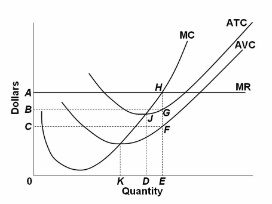Why is it difficult for the market to deliver socially efficient quantities of goods like clean air or street lighting?
What will be an ideal response?
Goods like clean air and street lighting are public goods. This means that individuals can consume these goods even without paying for them as they are non-rival and non-excludable. Such goods present particular problems for markets to provide because consumers have an incentive to act as free-riders; they can consume public goods even if they do not pay for them. Therefore, the problem with efficiently providing public goods is that consumers aren't willing to pay for them because no one can be excluded from consuming them once they are provided.
You might also like to view...
Refer to the diagram. At the profit-maximizing output, the firm will realize:

A. a loss equal to BCFG.
B. a loss equal to ACFH.
C. an economic profit of ACFH.
D. an economic profit of ABGH.
When the expenditure schedule is too low, the result is a(n)
A. unemployment surplus. B. inflationary gap. C. recessionary gap. D. budgetary gap.